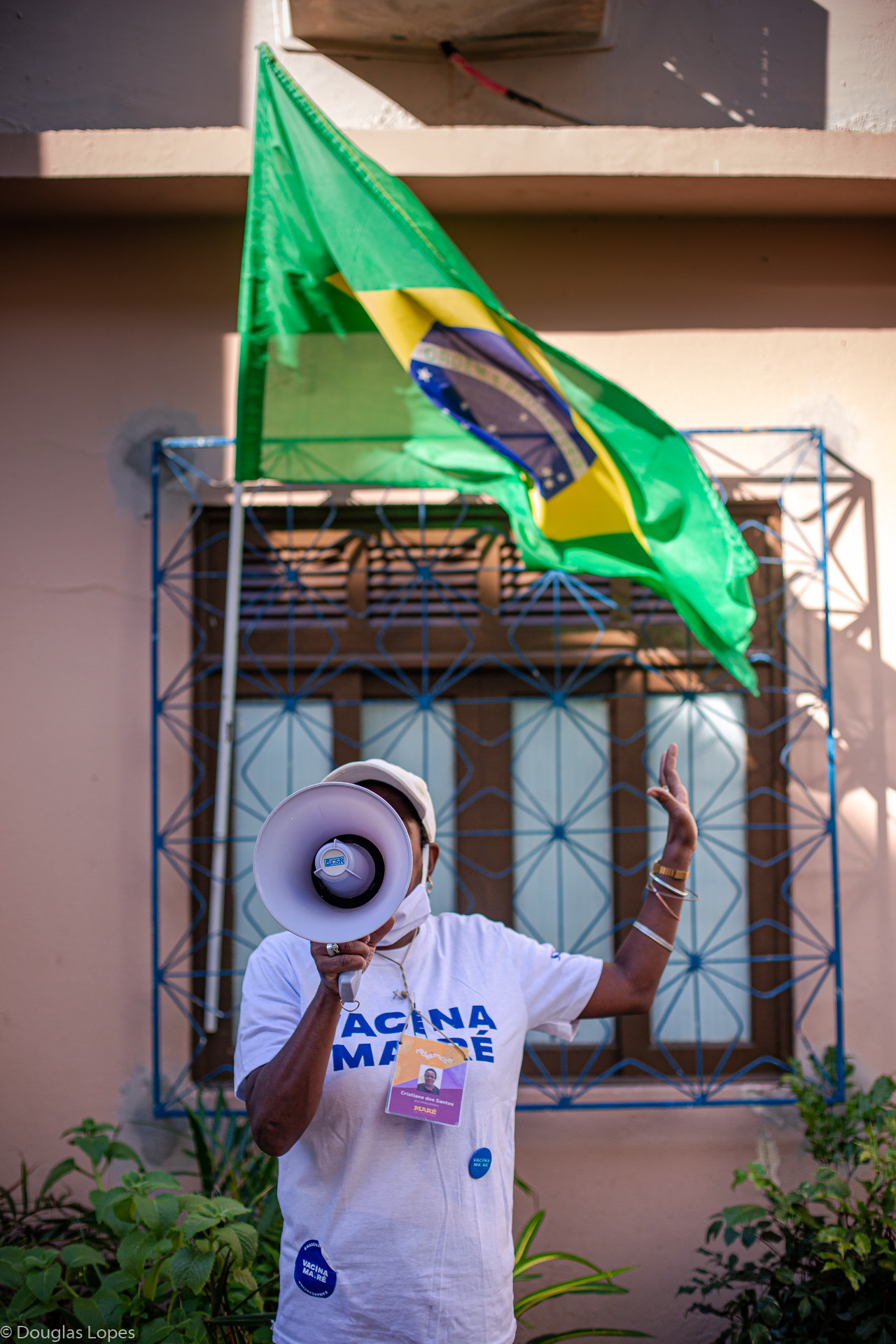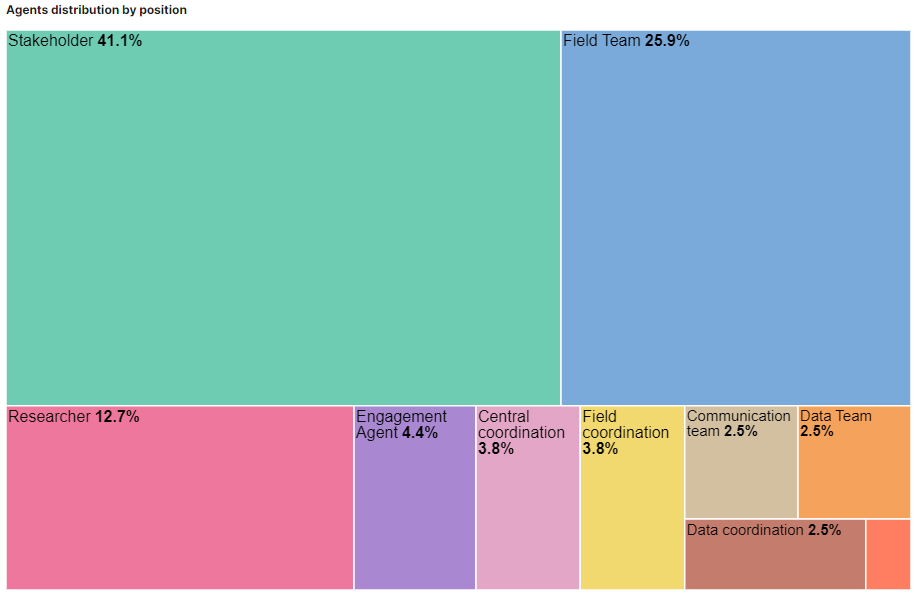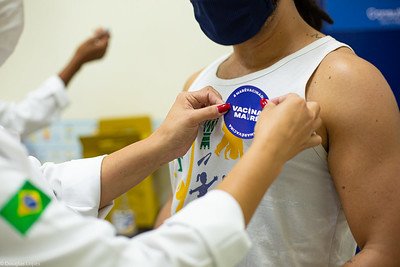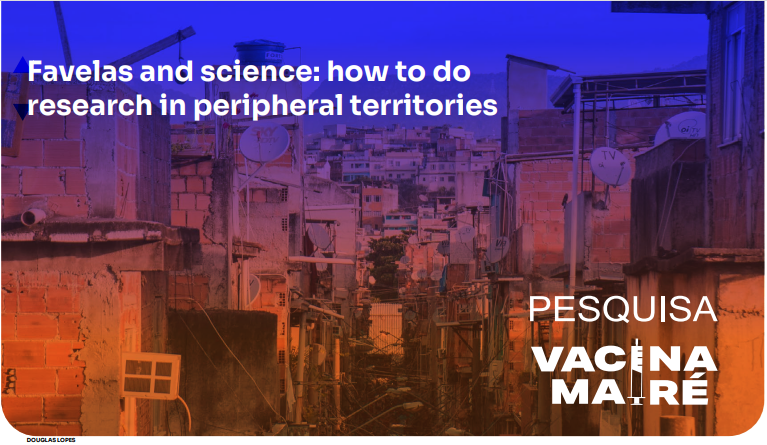The Vacina Maré Research (Maré Vaccine Research) is a Fiocruz initiative, in partnership with Redes da Maré (a non-governamental organisation) and the Rio de Janeiro City Hall, which began in 2021 with the aim of evaluating the effectiveness of the vaccine against COVID-19 and analysing the impact of the pandemic on the Maré community in Rio de Janeiro. The results and findings of this research contribute to a global study on vaccination, virus variants and the prolonged effects of COVID-19 (Long Covid) [1] [2] [3].

How did community and stakeholder engagement during the COVID-19 pandemic contribute to the development of the Vacina Maré Research?
The Maré favela complex is composed of 16 favelas located in the northern zone of Rio de Janeiro and home to approximately 140,000 inhabitants, each one with its own particularities. However, they all share the historical mobilisation and struggle of residents for better living conditions and guaranteed rights to housing, education, basic sanitation, public safety, and health.
In the context of the COVID-19 pandemic, mobilisation actions proved to be even more powerful. A lot of work was done to protect residents from contamination and to reduce the virus lethality, higher in favelas and peripheral territories.
Through the efforts of Redes da Maré (an organisation that has been working in the area for over 20 years) and Fiocruz's long-standing relationship with the Maré community, the dialogue began with other partners, such as SAS Brasil, Dados do Bem, the Manguinhos Community Council, with the support of ITpS - Instituto Todos pela Saúde (All For Health Institute) and the Rio de Janeiro City Hall, to build and carry out a project called Conexão Saúde (Health Connection) [4][5]. This project was an innovation that offered free testing to all Maré residents and, if COVID-19 infection was confirmed, access to medical, psychological and social care. Additionally, communication strategies were key to combating fake news and to preventing and promoting health in the area. Formal partners and stakeholders, as well as community engagement with neighbourhood associations, schools, Brazil’s Unified Health System (SUS) units, local shop owners and other NGOs, were key to the project's successful implementation.
The results of Conexão Saúde were truly impactful: the number of deaths from COVID-19 in Maré fell dramatically and the project further strengthened the articulation and partnership between stakeholders to carry out the COVID-19 vaccination campaign (Campanha Vacina Maré), which gave rise to the "Vacina Maré Research".
A structural feature of the research was the shared governance, enabling all voices to be heard. This characteristic was also a factor that contributed to the community and stakeholder engagement, as everyone was included in the study planning and management. A participatory and horizontal management environment was established, in which different types of knowledge were valued, from coordination to the field team, through the communication and territorial articulation team, including institutional partners (stakeholders from public and private institutions) and the community itself.
Stakeholder profile from the Pathfinder Vacina Maré
The Vacina Maré Research was selected as a Pathfinder in 2023 due to its success in the context of the pandemic in vulnerable territory, as well as the valuable lessons with transformative potential that goes beyond scientific publications. Pathfinder study focus on investigating and mapping the research cycle, contributing to other projects, especially those built in limited-resource research environments.
By identifying and recording stages, tracking key indicators such as time and resources required by the Vacina Maré Research, Pathfinder offers support in identifying and overcoming obstacles, seeking solutions to achieve the research objectives. A key part of the Pathfinder is capturing and sharing the tools, methods, technologies and governance processes used to tackle each challenge encountered, using the learned lessons and results to be disseminated among other research contexts that may face similar challenges.
One of the Pathfinder Vacina Maré results was a dashboard created to present the profile of the agents and stakeholders involved in the research. More than 150 agents were involved, representing more than 20 institutions and/or organisations. These agents were distributed according to specific functions: stakeholder, field team, researcher, engagement agent, central coordination, field coordination, data coordination, communication team, data team and communication coordination. We believe that all these roles were essential to achieving the successful results of the project. Access the dashboard live here.

A crucial element that characterises the Vacina Maré Research was precisely the collaborating governance, which brought together many initiatives, partnerships and actors to meet local demands and the study's needs, taking into consideration their particularities. To this end, teams were set up, including a central coordination team led by the Principal Investigator Fernando Bozza. Territorial articulation and personal and laboratory data collection were carried out by the field team, while another team oversaw the setting of how to collect, store and analyse the data. In addition, to promote community engagement, a communication team was formed along with the team of territorial organisers – all residents of Maré.
Building trust and long-term relationships with the community proved decisive for the success of the studies. The continuous involvement of key players allowed community residents to become active agents of change. Effective communication and feedback mechanisms promoted transparency and the advancement of the project. Also, the exchange of knowledge between different actors highlighted the importance of diverse perspectives in addressing the challenges. Institutional and community alliances and interdisciplinary collaboration boosted local initiatives, demonstrating the effectiveness of co-operation in achieving common goals.
What skills and strategies were needed to promote engagement in the Vacina Maré Research?

Maré has a history of territorial mobilisation that was enhanced by the pandemic. However, what enabled the mass vaccination campaign and the Vacina Maré Research was not only the community mobilisation, but also the existence a previously established methodology, developed by Redes da Maré - a social technology for community engagement that was applied before in contexts other than research.
Redes da Maré has been operating in the territory for more than 20 years, working from the perspective of expanding and guaranteeing rights, through political advocacy via community engagement. The novelty of the Vacina Maré Research was to apply this social technology to public health campaigns and health research processes. In other words, the scientific studies brought this matured social technology to the realisation of health research.
It is clear that Vacina Maré Research has its merits, as it managed to transform the production of scientific data into action, leveraging the knowledge and social technology that was already being developed by the civil society organisation. Nevertheless, it is essential to recognise that without this knowledge, which had already been well consolidated over the years, the research might not have been so successful. So, while in one hand the Research introduced new knowledge, in terms of data production and analysis in scientific health research, on the other, the research team learned a lot from the expertise accumulated in the Maré territory itself in terms of community engagement and territorial mobilisation.
Through the Pathfinder Vacina Maré it was possible to observe that the actions to face the pandemic that culminated in the Vacina Maré Research, community engagement was in fact both a structural and a structuring aspect for the results to be successful. We identified that for the mass vaccination and the Research to succeed, it was important to mobilise different actors and fronts in the territory, thus ensuring the participation of the largest number of people.
Mobilisation for the Vacina Maré Research involved various stakeholders and local actors, including workers from Redes da Maré, Fiocruz, Rio de Janeiro City Hall, schools, health units, residents' associations, shop owners, community organisations and local volunteers. Communication and mobilisation took place through door-to-door visits, the use of megaphones, flyers, sound cars and social media. Local influencers and artists produced informative content to engage the population. The City Council mobilised professionals from the Health and Education departments and made health units and schools available to vaccination points.
To promote the project's visual identity, items such as ecobags, t-shirts and squeezes were distributed. Communication was planned to be simple and effective, focusing on a language proper to the local public. Actions against fake news were carried out through rapid communication, social networks and partnerships with local influencers. The research team was mainly Maré residents with experience in health and community mobilisation, what made it easier to identify demands and to adjust to local needs.
The strategy also included adaptations to local conditions, such as the use of loudspeakers in areas with less access to the internet and visits outside of office hours. Including residents in the team allowed for a more organic identification of demands and a collective construction of solutions. Joint experience and the collective search for innovative solutions were fundamental to the results achieved.
About community and stakeholder engagement, what barriers, solutions and lessons has Pathfinder Vacina Maré identified?
The mobilisation of the community for vaccination against COVID-19 inaugurated the Vacina Maré Research and faced several barriers. Firstly, there were difficulties in convincing residents about the importance of vaccination, especially due to the spread of fake news. Another issue was the lack of a team dedicated to communication and community engagement, which limited local mobilisation efforts at the beginning of the project.
However, in the face of obstacles, many lessons were learnt that enabled effective solutions to be implemented. The community engagement process involved a variety of actors and having Maré residents on the team was fundamental to the success of the research. Establishing simple and direct communication methods and adapting the strategy based on feedback from the community organisers are some examples of essential actions to overcome the challenges.
The Vacina Maré Research aimed to contribute to collective health, but also to turn data into action to improve the quality of life of local residents, thus promoting community engagement for health equity. Several skills were necessary starting with in-depth knowledge of the community. Shared and horizontal management, intersectoral coordination, data consolidation and validation, the use of appropriate communication strategies and adaptation to local characteristics were fundamental to the success of community engagement. And, above all, the adoption of a social technology already well-established by Redes de Maré for territorial mobilisation made it possible to carry out research around public health.
In the toolkit "Favelas and science: how to do research in peripheral territories" you can learn more about the experience, challenges and lessons learnt in building community engagement for the Vacina Maré Research. Finally, we emphasise that when research is carried out with the community, the results tend to be more relevant and the actions more effective. Identifying and overcoming obstacles, sharing the results and implementing measures to improve quality of life are crucial steps, emphasising the importance of doing science with the population, not just for them.

Funding:
The results and findings of the research were part of a global investigation into vaccination, disease variants and post-covid effects (Long Covid) called EFFECT-Brazil. It was one of ten projects selected by ICODA (International Covid-19 Data Alliance), an initiative of the Bill and Melinda Gates Foundation. Pathfinder is an initiative funded by the Bill & Melinda Gates Foundation and the Welcome Trust.
Fotos por Douglas Lopes
Flickr: https://www.flickr.com/photos/redesmare/albums/72157719586288512/
References:
[1] RANZANI, Otavio T. et al. Vaccine effectiveness of ChAdOx1 nCoV-19 against COVID-19 in a socially vulnerable community in Rio de Janeiro, Brazil: a test-negative design study. Clinical Microbiology and Infection, v. 28, n. 5, p. 736. e1-736. e4, 2022. https://pubmed.ncbi.nlm.nih.gov/35150884/
[2] BATISTA-DA-SILVA, Amanda A. et al. Maré cohort-profile: a prospective cohort study based in a socially vulnerable community during the COVID-19 pandemic in Rio de Janeiro, Brazil. Gates Open Research, v. 7, n. 22, p. 22, 2023. https://gatesopenresearch.org/articles/7-22
[3] FISCHER, Ronald et al. What did you do to stay ‘sane’during the pandemic? A qualitative study to identify self-care mental health strategies utilized in a socially vulnerable population. Gates Open Research, v. 6, n. 79, p. 79, 2022. https://gatesopenresearch.org/articles/6-79
[4] AROUCA, L. E., and BOZZA, F. A. Integrando vigilância e atenção em saúde durante a pandemia de covid-19: a experiência do Conexão Saúde na Favela da Maré. In: PORTELA, M. C., REIS, L. G. C., and LIMA, S. M. L., eds. Covid-19: desafios para a organização e repercussões nos sistemas e serviços de saúde [online]. Rio de Janeiro: Observatório Covid-19 Fiocruz, Editora Fiocruz, 2022, pp. 457-472. Informação para ação na Covid-19 series. ISBN: 978-65-5708-123-5. https://doi.org/10.7476/9786557081587.0032
[5] CERQUEIRA, E. Conexão Saúde no enfrentamento da pandemia de Covid-19. In: MATTA, G.C., REGO, S., SOUTO, E.P., and SEGATA, J., eds. Os impactos sociais da Covid-19 no Brasil: populações vulnerabilizadas e respostas à pandemia [online]. Rio de Janeiro: Observatório Covid 19; Editora FIOCRUZ, 2021, pp. 209-219. Informação para ação na Covid-19 series. ISBN: 978-65-5708-032-0. https://doi.org/10.7476/9786557080320.0017

Please Sign in (or Register) to view further.